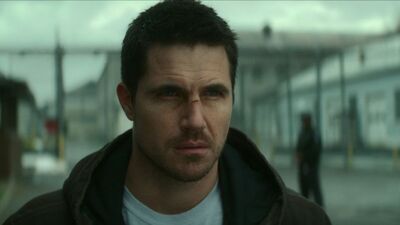Of course, this means King wants her dead and Connor must team up with Garrett in order to keep her safe. There’s more twists and turns, as Garrett continues to try to play both sides between his drug business, helping his community, and keeping the cops at bay. Although the conflicted Officer Park doesn’t appear in this installment, his partner Officer Davis (Aaron Abrams) does. His role here is deeply underwritten and the positioning of him as an ally to Connor and co., sends a mixed message in terms of what the film thinks about the police. Is this a case of one bad apple gumming up the system, or is the whole system irredeemable? As the film barrels towards its inevitable climax, the answer to that question remains unclear.
Part of the problem is that the plotting is not as tight as the first film, which was penned solely by Chris Paré. Here he shares writing credits with Chan, Sherren Lee, and Jesse LaVercombe, and there may well be too many cooks in the kitchen. However, Chan’s visual world-building remains sharp. The whole film has big, dilapidated Rust Belt vibes, from the rundown community center where Conor works as a janitor to the greasy spoon diner where he meets up with Garett. Everything here is gray and cold and bleak.
The action sequences remain cheesy, but fun, with both Amells having committed deeply to the bit, as they move objects at their will or harness the power of lightning with complete seriousness. One sequence featuring a powered named Tamera (Jessica Allen) who can erase memories is a particular standout in terms of mood and tension. Connor’s boss Mina (Jean Yoon), who can repel bullets, is also a welcome new addition.
Unfortunately, where the first film found a healthy balance between its heist plot and the human moments between Connor and his mother, “Part II” can’t seem to find the time to actually sit with these characters so that we care about them and the lives they are trying to lead in spite of all this heavy policing. Every conversation is in service of another plot point here, a piece of exposition there. The brothers do their best to add depth to the proceedings but are just not given enough time to let their characters breathe. A twist towards the end regarding King comes out of nowhere, revealing an added critique of assimilation over community that I wish had been more thoroughly explored earlier.

